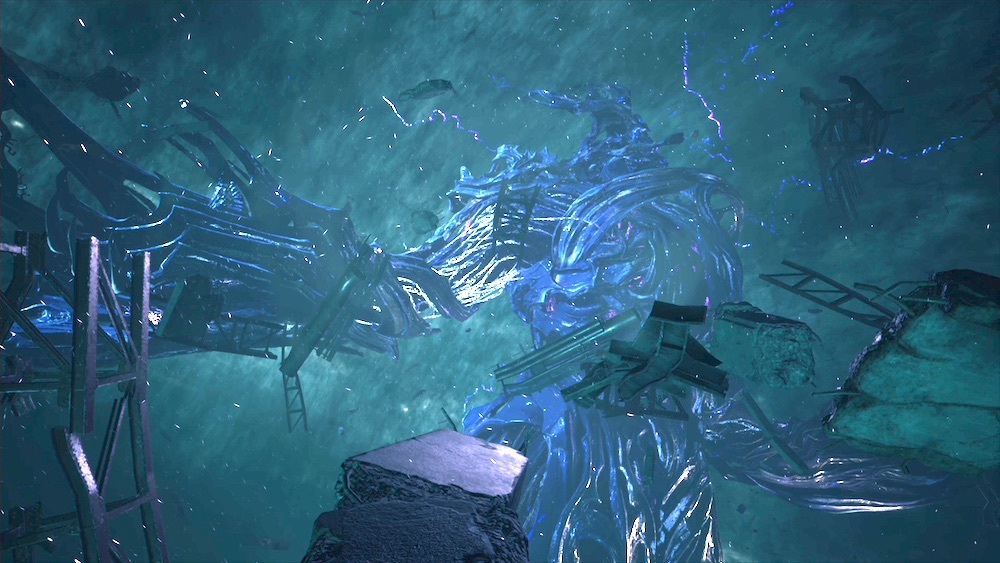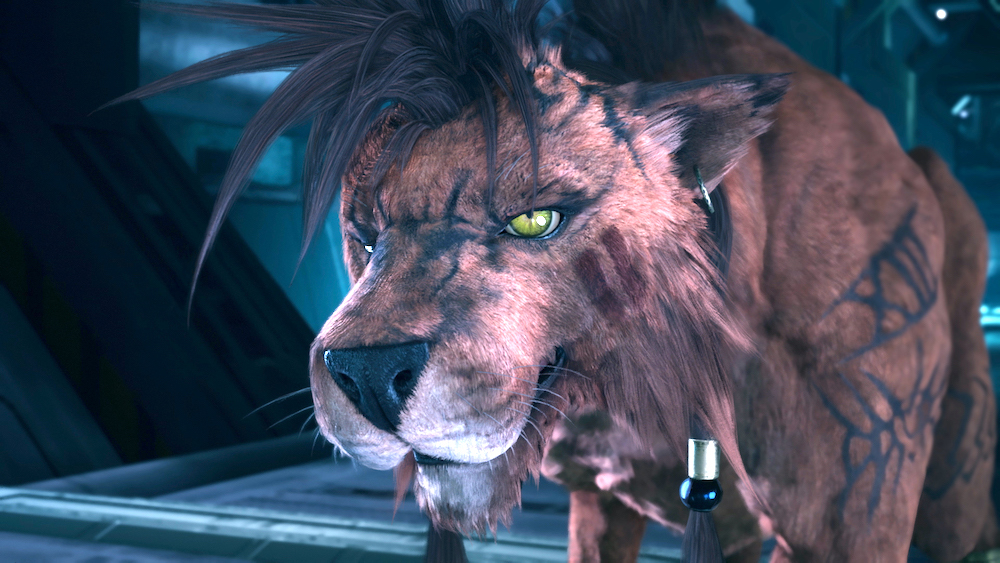Warning: There are going to be spoilers! Read on at your own risk!
The impressive thing about Final Fantasy 7 Remake is how grounded so much of it feels. Even if you're not familiar with Midgar, mako, or Materia, for the most part, the remake does a remarkably good job of dropping you into its world without leaving you to flounder. That's thanks to its expanded character development and focus on the human side of its major events--you might be wandering through a fantasy world, but you can relate to the people who live there and their universal hardships and triumphs.
Sure, there are scenes where a guy with a five-foot sword and a giant man with a gatling gun for an arm ride a subway and discuss being inconspicuous. But there are also more human moments, like when the members of Avalanche consider the collateral damage of their mission to blow up dangerous mako reactors, or when Shinra's employees express the fears they have about simply going to work with terrorist attacks on the rise.
So much of FF7 Remake is anchored in realistic human experience and relatable characters--and then you get to the game's conclusion. The ending has stirred up some controversy among fans for a few reasons, including the fact that it takes serious liberties with the existing FF7 story. But beyond a purist love of the original, the ending is also just kind of bad. It's a big narrative left turn in the last moments of the game; its meanings and implications--and even just the events being depicted--are unclear, and most of all, it doesn't feel like the rest of FF7 Remake.
That last point is the most important. FF7 Remake's Chapter 18 is a jarring departure from what makes the rest of the game work, and that's why it feels so off. It abandons relatable stakes for superheroics and chucks out knowable, human villains with clear (if cartoonishly evil) motivations for wholly supernatural entities that haven't even functioned as characters. The remake's ending stumbles because it feels like it belongs to a different game and a different story, confusing not just the FFVII Remake's narrative, but its approach to its themes and characters.

All of the “ending stuff” in FF7 Remake is relegated to Chapter 18, which sends the characters through a portal to fight the physical manifestation of fate: the Whispers. Those strange, ghostly flying cloak creatures have been present throughout the game, and figuring out their deal is a big element that the remake adds to the FF7 story. But their supernatural addition to the tale only becomes off-puttingly weird when the game's climax takes you to another dimension to fight a giant ghost-creature and its minions. While the Whispers have been around throughout the story, the game has never built them up as actual antagonists--and yet at the most important moment in the game's story, you're not fighting Shinra or working to save your friends in Sector 7, you're battling a bunch of literally faceless ghost-monsters whose motivations you barely understand.
Everything about the ending feels like it's out of step with the rest of the game. Remember how Cloud, Tifa, and Barret were outflanked when Shinra raised a ladder out of reach in the Sector 5 reactor? Remember when the team was gassed and locked in a dungeon by a local mob boss and his group of idiot lackeys? Remember when Tifa almost died when she tried to jump from one light fixture to another, misjudged the distance, and dropped 30 feet to the floor below?
Yes, your team does some amazing stuff throughout the course of Final Fantasy 7 Remake, but for the most part, it feels grounded to an extent. The stakes are clear and the characters face danger. Cloud might pull off a cool flip or fling a motorcycle at a helicopter here and there, but for the most part, when people fire guns at your characters, you know they could be hurt or killed. When someone almost falls off the side of a catwalk or a building, you recognize that they wouldn't have survived (unless there was a convenient bed of flowers waiting to cushion the landing).
Chapter 18, on the other hand, has the characters leaping between floating chunks of concrete, punching and kicking through piles of concrete and debris like so many Chris Redfields, and dodging the enormous fists of what might as well be a Final Fantasy Stay-Puft Marshmallow Man. It's all a lot more like FF7's CGI-animated sequel, Advent Children, than like the rest of the remake--and that movie was similarly criticized for focusing on superhero antics that were at odds with the original.

And that's to say nothing of the way the game introduces new elements and tells the story of its ending. Suddenly, Red XIII is an exposition machine ready to fill in details about how fate works, and Aerith is giving the Avalanche group a pep talk about killing a god (one assumes) as if she was just reading ahead in the script, Mel Brooks-style. If you'd never played FF7 and didn't know what was coming, the ending would be confusing, but even with full knowledge of what is meant to happen in future installments, the whole "lets stop and go kill Destiny" thing gets almost zero setup or explanation. It gets even worse once you win, with the ending throwing in a totally baffling scene between Cloud and Sephiroth immediately following their battle (apparently that previous battle was with a fake Whisper Sephiroth and the individual in the cutscene that follows is the true Sephiroth). And after that, the ending gives a zero-context look at Zack, a key character in Cloud's backstory, without providing any information about what it is you're seeing or why. That scene only makes sense if you're an FF7 fan, and even then, what it's supposedly showing us is completely opaque.
FF7 Remake's ending illuminates almost nothing at all. It's out of step with the entire rest of the game and it haphazardly throws in new narrative elements and characters without providing them any context--while also bending the existing characters into new shapes in order to make the ending work. It doesn't fit with the game, and in other circumstances, it would be a big letdown. But I'm still optimistic about FF7 Remake and what's to come later, because I think (and I'm hoping) that Square Enix has gotten all the weird nonsense out of the way.
Yes, Chapter 18 doesn't match the tone, the character, or the methodology of the rest of FF7 Remake. But while endings are important, it's also worth noting that Chapter 18 winds up being a super-small chunk of the overall experience. If 95% of FF7 Remake is relatively grounded and intensely focused on character development, it stands to reason that this is the approach the development team feels represents the game (and the series) they are making. The ending is an abnormality compared to the rest of FF7 Remake, which hopefully means it'll be an abnormality for the ongoing series, as well.
It's also important to consider the narrative work that Chapter 18 does. It might go about it in a goofy, chaotic way, but Chapter 18 opens the door for Square Enix to continue to reshape FF7. That might not be what every fan wants out of the remake, but it's clearly what the team making the game wants. Chapter 18 does carry all the narrative weight of explaining why it's possible for the story to change in the future--which hopefully means future installments won't have to spend that time themselves. Put another way: If we already fought and killed Destiny, the story doesn't have to do any additional weird fighting and killing Destiny stuff. That strangeness is now handled and out of the way.

And as Senior Editor Tamoor Hussain put it in our FF7 Remake spoiler chat podcast, the writing team on this game has earned the benefit of the doubt. So much of the story and character development in FF7 Remake works exceedingly well--better than it has any right to, really. Moments that are cringe-worthy in the original story are rescued by the remake, from the approach to dressing up for Don Corneo, to Aerith and Tifa's quick-developing friendship replacing a rivalry over Cloud. FF7 Remake improves a lot of things about the original; its creators deserve the leeway to continue telling the story as they want to tell it.
I think we'll get more of the 95% of what makes FF7R great, with the added benefit that now, longtime fans and newcomers alike are facing down a new, unpredictable story. Unfortunately, we don't know how long we'll have to wait to find out if I'm proven right.
Final Fantasy 7 Remake News
- Final Fantasy 7 Remake Intergrade Review - Materia Improvements
- Final Fantasy 7 Remake Dress Guide: How To Get Every Dress In Wall Market
- What Would Suit Tifa Choices: Final Fantasy 7 Remake Dress Guide
- + Show More Final Fantasy 7 Remake News Links (2)
- Final Fantasy 7 Remake Guide: Corneo's Secret Stash Locations
- Final Fantasy 7 Remake Materia Guide: Essential Materia You Might've Missed

